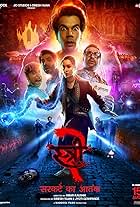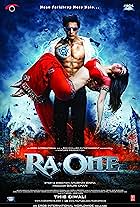Welcome to the new profile
We're still working on updating some profile features. To see the badges, ratings breakdowns, and polls for this profile, please go to the previous version.
Ratings1.1K
humanprojector's rating
Reviews12
humanprojector's rating
Maidaan is a strange film. It uses sports film templates yet doesn't quite abide. It shows us a team that is slowly inching towards the illusive win but then presents us a different story in parallel that is equally poignant. It spends as much time on the ground as it does in the slimy round tables of sports committee offices and hideous press meets and club evening toasts. It presents us a superstar in a vulnerable, underdog role but surprises us with the places it goes..
Maidaan as a film goes from strange to familiar to likeable to loveable. It takes us through this trajectory over 3 hours of screen time, where it explores how a battered football coach, Syed Abdul Rahim, selects players from across the country, battles politics, health issues and workplace toxicity back in the 50s, tries to balance being a good coach with being a good family man and a good father, and of course, smokes so many cigarettes you feel you are at risk from all the passive smoking.
Coming to the music, it is a great score of course but while few songs are well used (I just loved how Mirza is used in the film, I am a sucker for songs used in unexpected situations a la Thalli Pogathey or Tere Bina), some just play out like jingles which doesn't give the right respect to the beautiful compositions. I was especially miffed with how a number like Dil Nahi Todenge is just given a casual background treatment. The song is great, the lyrics are great, but the placement in the film feels so premature.
Some of the background pieces are so lush, so expressive, you get overwhelmed at first, then you fall in and get acquainted to the style. I can't remember a film over last few years where AR Rahman's score is so present in flesh and blood. Take the football match pieces, there is a full-blown symphony, there is a trap beat piece, and there are many cues and versions that celebrate songs like Dil Nahi Todenge, Mirza and Jaane Do throughout. Like Aadujeevitham, you will need to watch Maidaan again just to appreciate Rahman's score a little more.
All of these flaws are more than made up as we approach the stunner of the climax. Suddenly, you start relating to the characters, their struggles and pain, you start seeing the matches literally up and close, everything feels heavy and pertinent, the gravitas that the film displays here makes all the applauds that are coming its way well justified.
While disease and impending death is often captured melodramatically(or moronically as in Karan Johar films), in Maidaan, with Ajay Devgn, the master of underperformances at the helm, you get something refreshing. While many will argue over the years about how much pain is enough to show on screen, are we wasting our time watching this man coughing in silence over and over again, I was all for this smart choice in the narration, a bold choice that gives the film a reason to exist, and a reason to excel. And with AR Rahman's rousing score, you not only feel you are present in that very stadium, you also feel the pain of S A Raheem, it is a bittersweet moment, you are overwhelmed with emotion, you are clapping in tears as the titles roll.
Ajay Devgn as Coach Rahim might be my all time favorite performance of his, up there with The Legend of Bhagat Singh. In Maidaan, it is all about the meter of words and the way they are delivered. When Coach Rahim is looking for a striker at Hooghly Club in Calcutta, and there is a match between Calcutta & Hyderabad, the Calcutta coach asks him how come he is looking for a new striker in PK (Pradip Kumar Bannerjee), as he already had one in Chuni (Goswami), he shrugs in signature style and says, a lot changes in two years. This economy of lines and delivery stays consistent throughout the film. There are no filmy speeches or overt attempts at creating a room for applause. As a result, the impact is even more chilling, be it the locker room speech at the end ('Ek') or 'Iska Hisaab chahiye mujhe' or 'Jab tak main na boloon yahaan se hilna nahi' or 'Hum strategy ya gameplan kyun banaate hain...Maidaan mein tum utroge, main nahi..'. It is all such a thing of cinematic beauty.
Mr. Roy Chowdhary, eminent sports journalist, played masterfully by Gajraj Rao, wants India to lose time and again, for it boosts his ego and enmity with Rahim. His dynamic with Shubhankar (Rudranil Ghosh) is also very well etched out. At one point, Shubhankar questions him that why has he written in the news article that their win at Melbourne was out of fluke instead of writing that India missed out on Bronze, and he talks about less representation of their state (Bengal). Towards the very end, we see a changed Roy, he is the one cheering (silently) for Team India, while Shubhankar has essentially turned into Roy in the characteristic bitterness. The use of phrases with typical Bengali accent is another joy, 'bitter pill', 'souvenir'...
The team dynamic between players builds all so naturally.
AR Rahman themes go from soft/symphonic (with rich use of plucked strings that evokes tension) to operatic and heavy to also ominous. The heavy beats drumming up just before the interval creates a sense of a war-like foreboding.
Coach Rahim is never emotional, except for when Thangaraj (goalkeeper) gets injured and Shubhankar makes snide remarks. Ditto for Runa, who never breaks a tear even when she hears the news of his terminal illness. She goes about her house chores, until one day she doesn't find the regular massive stock of books in their house, she runs amuck as Ghar Aaya Mera Mirza soars with aalaap of Javed Ali and Richa Sharma to Rahman's electrifying Sufi music, and finds the pile of book in their backyard, she picks up the album where all milestones of Rahim are carefully collected, and sobs away, probably with a certain determination.
Finally, the most memorable last 10 minutes of cinema I have ever seen, are great not only because of the emotional beats but because the sporting has also achieved its own rhythm...who is playing who doesn't matter it's all a fine dance of bodies, dreams, energies and driven souls in three dimensions.
Coming to the music, it is a great score of course but while few songs are well used (I just loved how Mirza is used in the film, I am a sucker for songs used in unexpected situations a la Thalli Pogathey or Tere Bina), some just play out like jingles which doesn't give the right respect to the beautiful compositions. I was especially miffed with how a number like Dil Nahi Todenge is just given a casual background treatment. The song is great, the lyrics are great, but the placement in the film feels so premature.
Some of the background pieces are so lush, so expressive, you get overwhelmed at first, then you fall in and get acquainted to the style. I can't remember a film over last few years where AR Rahman's score is so present in flesh and blood. Take the football match pieces, there is a full-blown symphony, there is a trap beat piece, and there are many cues and versions that celebrate songs like Dil Nahi Todenge, Mirza and Jaane Do throughout. Like Aadujeevitham, you will need to watch Maidaan again just to appreciate Rahman's score a little more.
All of these flaws are more than made up as we approach the stunner of the climax. Suddenly, you start relating to the characters, their struggles and pain, you start seeing the matches literally up and close, everything feels heavy and pertinent, the gravitas that the film displays here makes all the applauds that are coming its way well justified.
While disease and impending death is often captured melodramatically(or moronically as in Karan Johar films), in Maidaan, with Ajay Devgn, the master of underperformances at the helm, you get something refreshing. While many will argue over the years about how much pain is enough to show on screen, are we wasting our time watching this man coughing in silence over and over again, I was all for this smart choice in the narration, a bold choice that gives the film a reason to exist, and a reason to excel. And with AR Rahman's rousing score, you not only feel you are present in that very stadium, you also feel the pain of S A Raheem, it is a bittersweet moment, you are overwhelmed with emotion, you are clapping in tears as the titles roll.
Ajay Devgn as Coach Rahim might be my all time favorite performance of his, up there with The Legend of Bhagat Singh. In Maidaan, it is all about the meter of words and the way they are delivered. When Coach Rahim is looking for a striker at Hooghly Club in Calcutta, and there is a match between Calcutta & Hyderabad, the Calcutta coach asks him how come he is looking for a new striker in PK (Pradip Kumar Bannerjee), as he already had one in Chuni (Goswami), he shrugs in signature style and says, a lot changes in two years. This economy of lines and delivery stays consistent throughout the film. There are no filmy speeches or overt attempts at creating a room for applause. As a result, the impact is even more chilling, be it the locker room speech at the end ('Ek') or 'Iska Hisaab chahiye mujhe' or 'Jab tak main na boloon yahaan se hilna nahi' or 'Hum strategy ya gameplan kyun banaate hain...Maidaan mein tum utroge, main nahi..'. It is all such a thing of cinematic beauty.
Mr. Roy Chowdhary, eminent sports journalist, played masterfully by Gajraj Rao, wants India to lose time and again, for it boosts his ego and enmity with Rahim. His dynamic with Shubhankar (Rudranil Ghosh) is also very well etched out. At one point, Shubhankar questions him that why has he written in the news article that their win at Melbourne was out of fluke instead of writing that India missed out on Bronze, and he talks about less representation of their state (Bengal). Towards the very end, we see a changed Roy, he is the one cheering (silently) for Team India, while Shubhankar has essentially turned into Roy in the characteristic bitterness. The use of phrases with typical Bengali accent is another joy, 'bitter pill', 'souvenir'...
The team dynamic between players builds all so naturally.
AR Rahman themes go from soft/symphonic (with rich use of plucked strings that evokes tension) to operatic and heavy to also ominous. The heavy beats drumming up just before the interval creates a sense of a war-like foreboding.
Coach Rahim is never emotional, except for when Thangaraj (goalkeeper) gets injured and Shubhankar makes snide remarks. Ditto for Runa, who never breaks a tear even when she hears the news of his terminal illness. She goes about her house chores, until one day she doesn't find the regular massive stock of books in their house, she runs amuck as Ghar Aaya Mera Mirza soars with aalaap of Javed Ali and Richa Sharma to Rahman's electrifying Sufi music, and finds the pile of book in their backyard, she picks up the album where all milestones of Rahim are carefully collected, and sobs away, probably with a certain determination.
Finally, the most memorable last 10 minutes of cinema I have ever seen, are great not only because of the emotional beats but because the sporting has also achieved its own rhythm...who is playing who doesn't matter it's all a fine dance of bodies, dreams, energies and driven souls in three dimensions.
My favorite things, among others, is to watch a healthy debate. And this film, an 'after-hours' dissection offers a fresh look at history that is mildly thought provoking yet surprisingly light-headed and entertaining. It does leave you with questions, answers, and some more things to reflect upon. As someone who comes from both the schools of thought through lineage, I chuckled at how accurate some depictions were- of believers, of naysayers and of followers who choose to follow for no particular or sound basis/reason. Rajkumar Santoshi and team have given us a film that feels fresh in its devices, the lightness of touching narratives set in stone through decades. AR Rahman's score gave me chills at many places. Goes without saying that man understand cinema, emotions, dialog and poignance of it all like a master. The use of silences and mellow instruments like a flute here a pipe there and the symphonic touches are just other-worldly and underline the film's honest storytelling. Vaishnav Jan To sequence, the opening credits, the end credits suite(Raghupati Raghav) and Godse theme are all Rahman gems from his endless vault of magic.
While the film is far from perfect, we do get flashes of command over scenes, over dialog and over techniques like camera angles and light that infuses life in what essentially is a four-walled play(given it is a play adaptation) within a film's periphery. I particularly liked the courage of the film to humanize these characters through addition of drama and side characters that give us a lens to peep into the ideologies and the ideological conflict at play. Gandhi Godse is definitely a worthy film to catch in the sea of noises. You will walk away with some good thought or the other, if nothing else, you will walk away with a few smiles.
While the film is far from perfect, we do get flashes of command over scenes, over dialog and over techniques like camera angles and light that infuses life in what essentially is a four-walled play(given it is a play adaptation) within a film's periphery. I particularly liked the courage of the film to humanize these characters through addition of drama and side characters that give us a lens to peep into the ideologies and the ideological conflict at play. Gandhi Godse is definitely a worthy film to catch in the sea of noises. You will walk away with some good thought or the other, if nothing else, you will walk away with a few smiles.






















































